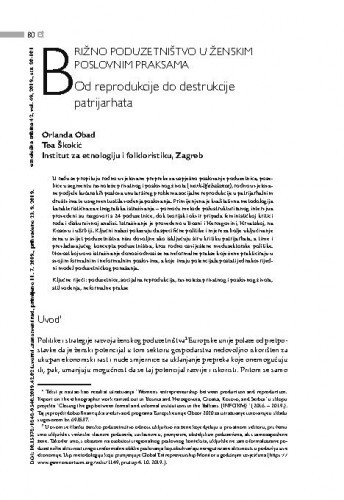U radu se propituju rodno uvjetovane prepreke za uspješno poslovanje poduzetnica, posebice u segmentu ravnoteže privatnog i poslovnog života (work-life balance), rodno uvjetovane podjele kućanskih poslova unutar šireg problema socijalne reprodukcije u patrijarhalnim društvima te u segmentu stila vođenja poslovanja. Primijenjena je kvalitativna metodologija karakteristična za etnografska istraživanja – pomoću metode polustrukturiranog intervjua provedeni su razgovori s 24 poduzetnice, dok teorijski okvir pripada feminističkoj kritici roda i diskurzivnoj analizi. Istraživanje je provedeno u Bosni i Hercegovini, Hrvatskoj, na Kosovu i u Srbiji. Ključni nalazi pokazuju da specifične politike i mjere za bolje uključivanje žena u svijet poduzetništva nisu dovoljne ako isključuju širu kritiku patrijarhata, a time i prevladavajućeg koncepta poduzetništva, kroz rodno osviještene međusektorske politike. Novost koju ovo istraživanje donosi odnosi se na neformalne prakse koje žene prakticiraju u svojim formalnim i neformalnim poslovima, a koje imaju potencijala postati jednakovrijedni model poduzetničkog ponašanja.; In this article the authors examine gender-based obstacles to successful female entrepreneurs’ business practices, especially regarding work-life balance, gendered divisions of domestic labour within the wider problem of social reproduction in patriarchal societies, and business leadership. The authors have applied a qualitative methodology characteristic of ethnographic research. They analyse material from 24 semi-structured interviews with women entrepreneurs. The article’s theoretical perspective draws on the feminist critique of gender and discourse analysis, and the research was conducted in Bosnia and Herzegovina, Croatia, Kosovo and Serbia. The key findings demonstrate that policies and measures intended for the better inclusion of women in the world of entrepreneurship do not suffice unless they are embedded within a wider framework of the critique of patriarchy, as well as within a critique of the dominant concept of entrepreneurship, through gender-conscious intersectoral policies. This research’s originality lies in its focus on informal practices, which women perform in both their formal and informal businesses, and which have the potential to become an equally valid model of entrepreneurial behaviour.
Sažetak

 Etnološka tribina : 49,42(2019) / glavna urednica Petra Kelemen.
Etnološka tribina : 49,42(2019) / glavna urednica Petra Kelemen.